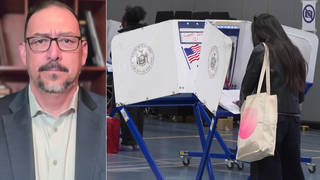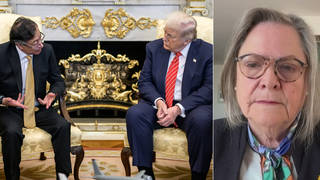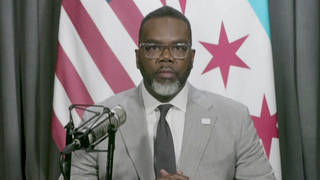
While much of the recent interest in Jeffrey Epstein has focused on the late sexual predator’s relationship with President Donald Trump, his emails also reveal his close relationships with other powerful figures from the worlds of politics, finance, academia and beyond. The thousands of files released by the House Oversight Committee earlier this month include his correspondence from April 2011 through January 2019, after he was already a registered sex offender for abusing underage girls in Florida. The fact that so many prominent and influential people could ignore those crimes is indicative of their membership in a “borderless network of people who are more loyal to each other” than anything else, says journalist Anand Giridharadas. “He had chosen this particular kind of social network, this American power elite, because he could be sure that it would be able to look away.”
Giridharadas is author of Winners Take All: The Elite Charade of Changing the World and recently wrote about the Epstein emails for The New York Times opinion section.
Transcript
AMY GOODMAN: This is Democracy Now!, democracynow.org, The War and Peace Report. I’m Amy Goodman.
We begin today’s show looking at the growing scandal around the late convicted sex offender Jeffrey Epstein, both his ties to President Trump and a network of prominent politicians, academics, philanthropists, diplomats and other public figures.
Last week, Congress overwhelmingly voted — almost unanimously, save one congressman, both in the Senate and the House — to compel the Justice Department to release all files related to Epstein, who died in 2019 in prison after he was arrested on federal charges for the sex trafficking of minors. President Trump signed the legislation but has repeatedly described the call to release the Epstein files to be a “hoax.”
Earlier this month, he snapped at a female reporter aboard Air Force One about the Epstein files.
CATHERINE LUCEY: If there’s nothing incriminating in the files, sir, why not act — why not —
PRESIDENT DONALD TRUMP: Quiet! Quiet, piggy.
AMY GOODMAN: Yep, you heard it right. “Quiet, piggy,” he said to the female reporter. Trump made the comment shortly after House Republicans released 20,000 files from Epstein’s estate, putting a new spotlight on the late convicted sex offender’s connections with a network of wealthy and powerful figures.
For years, survivors of Epstein’s abuse have talked about how the scandal is about far more than just Epstein. This is the late Virginia Roberts Giuffre speaking to 60 Minutes in 2019.
VIRGINIA ROBERTS GIUFFRE: I was trafficked to a lot of types of different men. I was trafficked to other billionaires. I was trafficked to politicians, professors, even royalty. So, the circles that Jeffrey Epstein ran in weren’t your typical setting of human trafficking, you know, and it was — it was the elite of the world. It was the people who run the world. It was the most powerful people in the world. And those are our leaders. Those are the people that we are supposed to look up to. It’s corrupt. It’s corrupt to the core.
AMY GOODMAN: That was Virginia Roberts Giuffre in 2019. She died earlier this year by suicide in Australia.
We’re joined now by Anand Giridharadas, author of several books, including Winners Take All: The Elite Charade of Changing the World, also the publisher of the Substack newsletter The.Ink. His recent piece for The New York Times is titled “How the Elite Behave When No One Is Watching: Inside the Epstein [Emails].”
Anand writes, quote, “When Jeffrey Epstein, a financier turned convicted sex offender, needed friends to rehabilitate him, he knew where to turn: a power elite practiced at disregarding pain.”
Anand, thanks so much for being with us.
ANAND GIRIDHARADAS: It’s great to be back with you.
AMY GOODMAN: So, talk about looking at the emails, what you looked at. And as you congratulate the women and talk about their bravery for coming forward, you take a very interesting look at who these people are that Epstein surrounded himself with, this elite network, as you talk about “the Epstein class.”
ANAND GIRIDHARADAS: Look, there is no doubt that at the beating, dark heart of this story is one monstrous man in Jeffrey Epstein, who did monstrous things, as Virginia was very bravely talking about there. But I think there’s a lot of powerful people in this country who would like the story to begin and end with one monstrous man.
And when these emails were released, I decided, maybe against my better judgment, that I was going to read all of them. And it took me four or five days just going through one after another, making notes. And I was really curious about all these other people, right? And some of them are celebrities and bold-faced names like she was talking about. Some of them are utterly ordinary people no one’s ever heard of. Some of them are professors, others. But I was interested in this larger network, because these were the people that Jeffrey Epstein had, in effect, chosen to rehabilitate him socially and redeem him after he was a convicted sex offender trying to reestablish himself in society. And I was trying to understand how these relationships worked.
And what I found was that it’s very convenient for the American power elite to think about this as a story of one depraved man. But, in fact, what the emails show, if you actually read them, is that he had chosen this particular kind of social network, this American power elite, because he could be sure that it would be able to look away at what he did, because it was very gifted at looking away over a generation at so much else, so much else, so much other abuse and suffering, whether the economic crises members of that network often helped cause, the wars members of that network helped push fraudulently, the pain of technological obsolescence that members of that network pushed on the American public. So, this was a group of people well chosen by Jeffrey Epstein, because this American power elite, these circles that he moved in, if they have any superpower, it is the ability to hear the cries of people without power and close their ears.
AMY GOODMAN: You write, powerfully, in this piece it’s “a tale [about a] powerful social network in which some, depending on what they knew, were perhaps able to look away because they had learned to look away from so much … abuse and suffering.” And you often talk about them being on both sides of the political spectrum. You talk — and, of course, it’s not just American. You’re talking about a British prince, though he’s been stripped of that title, Andrew. You’re talking about the Israeli former Prime Minister Ehud Barak and others. How did he manage to do this?
ANAND GIRIDHARADAS: So, you know, a network, as you rightly kind of imply with the question, it needs connectivity. It needs something to hold people together. So, that’s what I was after as I read the emails. What was holding this together? Right? Why would these people be in cahoots with such a depraved person? There’s a lot of choices of people out there in the world.
Well, as I read the emails, it seemed to me there were a few different things going on. One, this is a group of people who are not really loyal to the communities they come from. They’re not — their loyalty is not downward to places and communities and even countries. This is a kind of borderless network of people who are more loyal to each other than to places. And that kind of network actually needs someone who is a connector. So, a lot of the emails are, “Hey, I’m landing in New York,” “Hey, I’m going to San Francisco.” And then Epstein would say, “Hey, you should meet this guy in San Francisco,” “Oh, you need an investor for your startup? Let me connect you with that.” It’s all about this kind of connectivity. And he was a very good connector.
Second, this is a network that thrives on information barter, and specifically nonpublic information. Again, why would they consort with this guy? Well, this guy ended up being — and not just his own information. He ended up being a kind of convener of these trades of nonpublic information. Investors want information that will help them, you know, make trades that other people don’t know about. You know, professors want insight about things. People in the business world want tips about things that will be the next big thing. So there was this kind of information network. Larry Summers, the former treasury secretary, wanted dating advice. There was this —
AMY GOODMAN: He was the Harvard president, and the dating advice, he wanted extramarital advice on how to get his mentee into bed.
ANAND GIRIDHARADAS: Yes, while his wife was emailing with Epstein about how to contact Woody Allen. This is the kind of family.
And I just want to say that I think this is really important for folks to understand. Larry Summers, former treasury secretary — these sound like fancy titles. Let me break it down for folks. When someone is a treasury secretary or someone is an economic adviser, as he was to Barack Obama when he was president, someone like Larry Summers is not simply crunching numbers. Someone like that is making decisions about how your family functions. Someone like that in that kind of position of power is making decisions about how your workplace operates. Someone in that kind of position of power is deciding so many things about your life.
So, when you see that that person has no problem with the sex abuse of children, when you see that someone like that is turning to a convicted sex offender for 9-year-old-boy-level dating advice, and has actually such a — such a feeble understanding of other human beings, these are the people making decisions about your family’s economic future. These are the people deciding whether to bail out corporations or homeowners after a financial crisis. These are the people governing your life, people who maybe have all the credentials but have so little human judgment.
So, if you have lived in this economy over the last generation and have felt, “Who are these people governing me, such that I have so much pain, such that all my needs go unmet?” well, it’s because it’s a bunch of people who wouldn’t recognize a human being if it was sitting right across from them.
AMY GOODMAN: You write, “If you were an alien landing on Earth and the first thing you saw was the Epstein emails, you could gauge status by spelling, grammar, punctuation. Usage is inversely related to power in this network. The earnest scientists and scholars type neatly. The wealthy and powerful reply tersely, with misspellings, erratic spacing, stray commas. The status games belie a truth, though: These people are on the same team.”
ANAND GIRIDHARADAS: Yeah. You know, it’s so interesting that there are these little — these little status games and power games, and the truly wealthy and kind of well-connected to this network will dash off these kind of mistake-strewn replies. But, yes, the ultimate point is that for all the differences — professors, wealthy people, scientists, you know, cabinet secretaries — for all the different professions in the network, different attitudes, different statuses, they were all on the same team. And it’s important to understand that.
In one of the emails, Jeffrey Epstein is inviting Steve Bannon, the Trump strategist and whisperer, over for dinner, right? As extreme a figure on the right as you’ll find. And he says, “Who would you like as dinner company? I can invite whoever you’d like? Would you like Kathryn Ruemmler?” who was Barack Obama’s, obviously, Democrat, White House counsel.
AMY GOODMAN: Went on to Goldman Sachs.
ANAND GIRIDHARADAS: And went on to Goldman Sachs. And so, you think about — just think about as you think about the dinners you have at your houses, for everybody watching this. Steve Bannon — by the way, in some of the emails, Jeffrey Epstein is very angry at everything that Trump is doing, but, “Steve Bannon, come for dinner,” right? And then, “Would you like Kathryn Ruemmler?”
And then Kathryn Ruemmler becomes this fascinating figure in these emails, because she was Obama’s White House counsel, at some point, reportedly, was considered for attorney general. Who does she go to for advice? “Should I take this attorney general job?” Jeffrey Epstein, convicted sex offender. That’s who she goes to for advice. It’s worth getting more friends sometimes.
And then she goes on to Goldman Sachs. And again, your viewers are not — this will not surprise them. But this idea that someone who was once the lawyer for the American presidency goes on to be the lawyer for Goldman Sachs, just because it is normal doesn’t mean we shouldn’t think it’s not strange. It means that people in those government jobs do them kind of gently, because they got to keep that door open.
And she, at some point, quite famously now, describes in an email to Epstein — she’s driving to New York. She’s going to go see him. She’s going to go have lunch with him or something. And she says, “You know, I’m going to stop at a New Jersey rest stop, and I’m going to see all these people who are a hundred pounds overweight, and I’m going to freak out, have a panic attack about it, and then I’m never going to eat a bite of food again, in the hope that I never become like these people.” And that phrase has not left me, Amy, “these people.”
“These people.” Everybody in that network — well, not everybody, but certainly a lot of people I saw in that network — that is how they viewed you. That is how they viewed the public: “these people,” these fat people, these dumb people, these people who don’t know better, these people who don’t know that we’re all consorting and in cahoots, these people to whom we feel no loyalty.
Of course, Goldman Sachs then declared, a few years after she joined, that anti-obesity drugs are a $100 billion opportunity. So, there’s a contempt, a sneering contempt, for “these people” who are not in this powerful Epstein class. But there’s always an endless opportunity to make money off of “these people.”
AMY GOODMAN: I’m going to end where you end your New York Times piece, with the courage of the Epstein survivors, writing, quote, “the unfathomably brave survivors who have come forward to testify to their abuse have landed the first real punch against Mr. Trump. In their solidarity, their devotion to the truth and their insistence on a country that listens when people on the wrong end of power cry for help, they shame the great indifference from above. They point us to other ways of relating.” So, let’s turn to Epstein survivor Teresa Helm on Democracy Now! in July.
TERESA HELM: We cannot continue to have these people or systems continue to get away with anything that they can get away with, because they’re not — they’re skating through. They’re dodging accountability. There’s too much money involved, so, you know, people silenced through money. We have got to change the — it’s degrading our society to continue to allow these predators and perpetrators to get away with harming so many people.
AMY GOODMAN: Anand, your final comment?
ANAND GIRIDHARADAS: I would respectfully correct something that Virginia Giuffre said. She said she was trafficked to a bunch of leaders.
AMY GOODMAN: At the beginning, yes.
ANAND GIRIDHARADAS: I would say she is a leader who was trafficked to a bunch of cowards. They’re — and all these women have proven themselves to be the actual leaders, because leaders are brave, they take risks, they do what’s right even when it’s not convenient. And what has been revealed, ultimately, by this Epstein story is that we are led by a group of people who do not deserve to be called leaders. And these women point to what leadership looks like.
AMY GOODMAN: Anand Giridharadas is the author of several books, including Winners Take All: The Elite Charade of Changing the World. He’s the publisher of The.Ink newsletter on Substack. And we’ll link to his piece in The New York Times, headlined “How the Elite Behave When No One Is Watching: Inside the Epstein Emails.”
Coming up, we look at Venezuela, as the Trump administration ramps up military pressure on the Venezuelan president. Stay with us.













Media Options